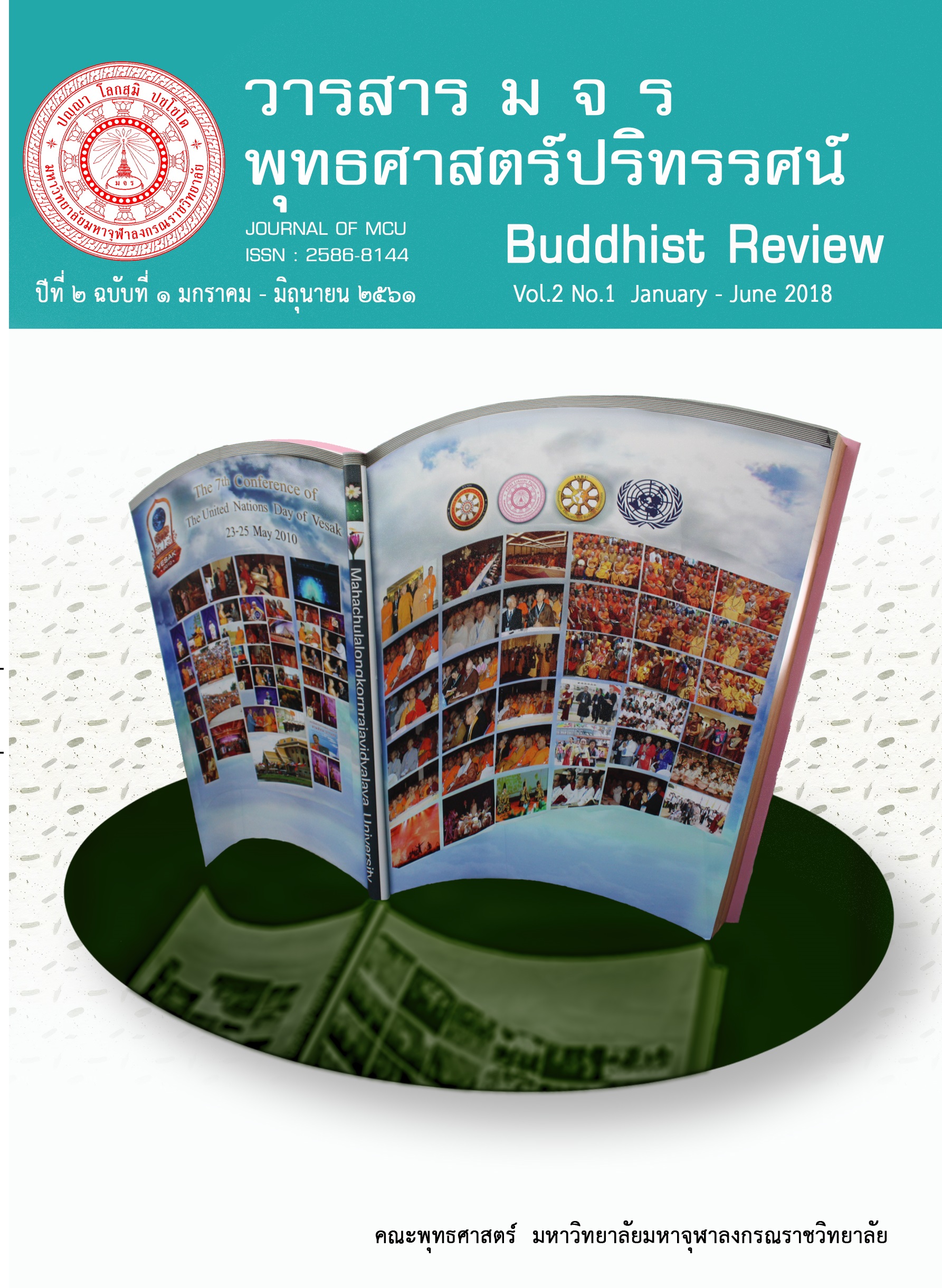วิเคราะห์หลักกรรมในฐานะโอกาสพัฒนาตนเพื่อรู้แจ้งสัจธรรม
Main Article Content
บทคัดย่อ
บทความนี้มีวัตถุประสงค์เพื่อวิเคราะห์หลักกรรมในฐานะโอกาสของการพัฒนาจิตของแต่ละคนให้บรรลุถึงเป้าหมายคือนิพพาน ความเชื่อเรื่องกรรมของชาวพุทธในปัจจุบันแตกต่างจากหลักคำสอนเดิมเพราะได้รับอิทธิพลแนวคิดเทวนิยมและปัจเจกนิยมเชิงวัตถุวิสัยที่มองว่ามนุษย์เป็น “ผู้ถูกกระทำ” และกลายเป็น“ผู้มีบาปจะต้องถูกลงโทษ” ความจริงหลักกรรมคือโอกาสของการพัฒนาจิตให้เป็นอิสระจากการยึดติดและการถูกทำโทษ พระพุทธศาสนาสอนหลักความจริงที่กำลังปรากฏขึ้นในขณะปัจจุบันในฐานะรูปและนามเท่านั้นไม่เกี่ยวข้องกับอำนาจของสิ่งศักดิ์สิทธิ์แบบเทวนิยมใด ๆ การคิด ความเชื่อและความเข้าใจ เป็นต้น ล้วนจัดเป็นความคิดปรุงแต่ง (สังขาร) ซึ่งตกอยู่ในภาวะเกิดและดับทุกขณะ แต่เนื้อหาของสังขารทำการผูกโยงมโนภาพที่เกิดจากสัญญาให้มีเส้นแบ่งระยะเวลาเป็นอดีต อนาคตในความคิดซึ่งก่อให้เกิดความคิดว่า “มีตัวตน” ดังนั้น กรรมตามความเข้าใจของคนทั่วไปจึงนำไปสู่อัตตานุทิฏฐิหรือภวทิฎฐิซึ่งเป็นมิจฉาทิฐิอย่างหนึ่ง ความเข้าใจผิดนี้เกิดจากการมองหลักกรรมเชิงหลักการแบบวัตถุวิสัยมากกว่าสภาวะความจริงแบบอัตตวิสัยในขณะปัจจุบัน กรรมคือสภาวะของความคิดเป็นส่วนหนึ่งของจิตที่เป็นไปอยู่ในขณะปัจจุบัน และเปิดโอกาสให้มีการพัฒนาสติปัญญาเพื่อกั้นไม่ให้หลงยึดเนื้อหาของความคิดเป็นตัวตน จิตก็คือกระบวนการของวัฏฏกรรมซึ่งมีแรงผลักคือกุศลหรืออกุศล เกิด-ดับและเสวยวิบากทุกขณะจิตในปัจจุบัน ดังนั้น กรรมคือโอกาสในการตั้งจิตเปลี่ยนจากอกุศลจิตเป็นกุศลหรือจากกุศลเป็นอกุศลจิตขึ้นอยู่กับความเห็นถูกหรือความเห็นผิด โดยมีเป้าหมายพัฒนาจิตให้มีสติสัมปชัญญะเพื่อบรรลุถึงมรรคจิต
Article Details
- บทความที่ได้รับการตีพิมพ์เป็นลิขสิทธิ์ของวารสาร มจร พุทธศาสตร์ปริทรรศน์
- ข้อความใดๆ ที่ปรากฎในบทความที่ได้รับการตีพิมพ์ในวารสาร ถือเป็นความรับผิดชอบของผู้เขียนบทความ และข้อคิดเห็นนั้นไม่ถือว่าเป็นทัศนะและความรับผิดชอบของกองบรรณาธิการวารสาร มจร พุทธศาสตร์ปริทรรศน์
เอกสารอ้างอิง
มหาจุฬาลงกรณราชวิทยาลัย. พระไตรปิฎกภาษาบาลี ฉบับมหาจุฬาเตปิฏกํ, ๒๕๐๐.กรุงเทพมหานคร : โรงพิมพ์มหาจุฬาลงกรณราชวิทยาลัย, ๒๕๓๕.
มหาจุฬาลงกรณราชวิทยาลัย. พระไตรปิฎกภาษาไทย ฉบับมหาจุฬาลงกรณราชวิทยาลัย, กรุงเทพมหานคร: โรงพิมพ์มหาจุฬาลงกรณราชวิทยาลัย, ๒๕๓๙.
พระพรหมโมลี (วิลาศ ญาณวโร). กรรมทีปนี, เล่ม ๑. สงขลา: สำนักปฏิบัติธรรมประจำจังหวัดสงขลา, ๒๕๕๒.
พระพรหมคุณาภรณ์ (ป.อ.ปยุตฺโต). พุทธธรรม. (ฉบับปรับขยาย). พิมพ์ครั้งที่ ๓๒. กรุงเทพมหานคร: กองทุน ป. อ. ปยุตฺโต เพื่อเชิดชูธรรม, ๒๕๕๕.
พุทธทาสภิกขุ. กรรมและการอยูเหนือกรรม.กรุงเทพฯ : ธรรมสภา, ๒๕๓๙.
พุทธทาสภิกขุ. ท่านพุทธทาสกับการศึกษา. กรุงเทพมหานคร : โรงพิมพคุรุสภา, ๒๕๔๕.
สมภาร พรมทา. พุทธศาสนากับวิทยาศาสตร์, พิมพครั้งที่ ๒. กรุงเทพมหานคร : จุฬาลงกรณมหาวิทยาลัย, ๒๕๔๐.
สุภาพรรณ ณ บางช้าง. พุทธธรรมที่เป็นรากฐานสังคมไทย ก่อนสมัยสุโขทัยถึงก่อนการปลี่ยนแปลงการปกครอง.กรุงเทพมหานคร : โครงการเผยแพรผลงานวิจัย ฝายวิจัยจุฬาลงกรณมหาวิทยาลัย, ๒๕๓๖.
Yativara Shri Bole Baba. Brahmasutrabhāsaya of Sankara with Ratnaprabhā. Trans. By.III Vols.1960.
Nyanatiloka. Buddhist Dictionary Manual of Buddhist Terms and Doctrines. Kandy: Buddhist Publication Society.1980.
Paul Dahlke. Kamma - Buddhist Essays.trans. from the German - Bhikkhu SÏlÈcÈra, Macmillan and Co. Ltd., London. 1908.
Charles Eliot.Hindu and Buddhism. London: Routledge & Kegan Paul. 1921.


